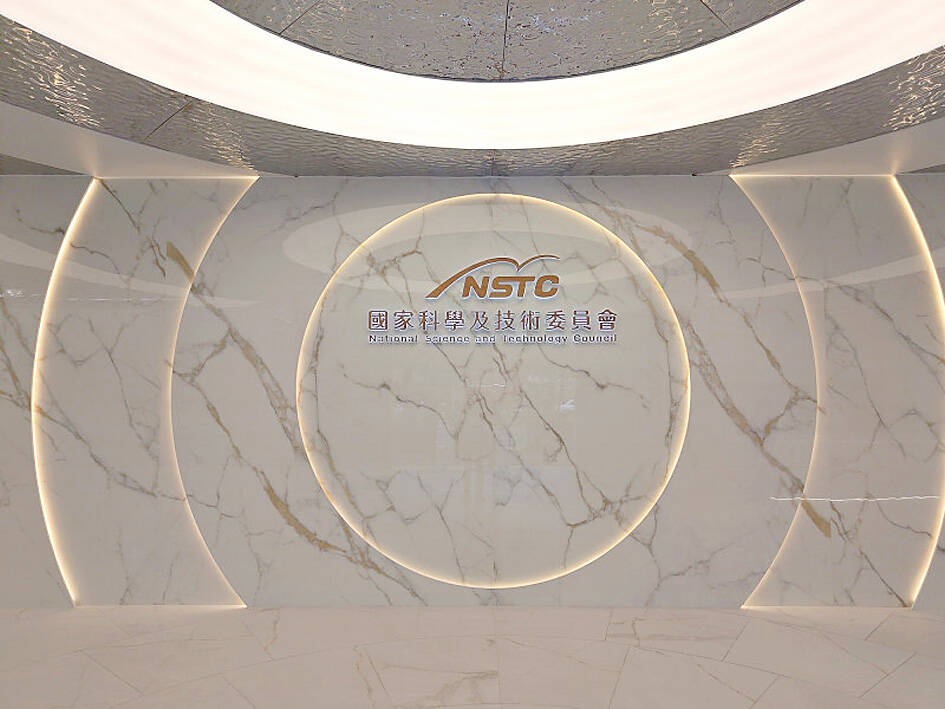Five hundred academics have signed a petition urging continued government support for multidisciplinary research on sustainable development after rumors suggested the National Science and Technology Council would shift gears on scientific funding.
Rumors have suggested that the council is considering cutting funding for multidisciplinary research in sustainable development, disaster management and spatial information technology, the petition said.
Officials who supported the move purportedly believed the state-funded research programs in these fields lacked focus and did not achieve the desired results, it said.

Photo: Wu Po-hsuan, Taipei Times
That assertion would be surprising, as these fields are key to President William Lai’s (賴清德) digital transformation, resilient Taiwan and sustainable environment initiatives, it said.
The council’s proposed strategy to re-entrench the division between fields of study would contradict modern scientific approaches and would not be fair to those who have worked to develop science in Taiwan in the past 30 years, it said.
The government should take seriously the complex challenges and requirements in Taiwan’s quest for sustainable development, the academics said, adding that the council should have been more transparent and communicative in the policymaking process.
Academia Sinica Biodiversity Research Center fellow Li Wen-hsiung (李文雄), Academia Sinica Institute of Earth Sciences Research fellow Chang Wen-yen (張文彥) and University of Taipei president Elton Chiu (邱英浩) are among the academics who signed the petition.
The council said that the scientific research budget has been increased every year and that further discussion is required to adjust the government’s strategy.
The council said it understands that Taiwan’s societal problems require dialogue between different fields and complex solutions, adding that it has invested NT$480 million (US$15 million) this year and would invest another NT$520 million next year to address such problems.
It is committed to discussing the national strategy for sustainability, disaster management and spatial information technology research with the nation’s academics to better respond to challenges, the council said.
It would consult with domestic experts to make the best use of the nation’s resources and broaden academic participation in crucial research goals, the council added.

CHAOS: Iranians took to the streets playing celebratory music after reports of Khamenei’s death on Saturday, while mourners also gathered in Tehran yesterday Iranian Supreme Leader Ayatollah Ali Khamenei was killed in a major attack on Iran launched by Israel and the US, throwing the future of the Islamic republic into doubt and raising the risk of regional instability. Iranian state television and the state-run IRNA news agency announced the 86-year-old’s death early yesterday. US President Donald Trump said it gave Iranians their “greatest chance” to “take back” their country. The announcements came after a joint US and Israeli aerial bombardment that targeted Iranian military and governmental sites. Trump said the “heavy and pinpoint bombing” would continue through the week or as long

TRUST: The KMT said it respected the US’ timing and considerations, and hoped it would continue to honor its commitments to helping Taiwan bolster its defenses and deterrence US President Donald Trump is delaying a multibillion-dollar arms sale to Taiwan to ensure his visit to Beijing is successful, a New York Times report said. The weapons sales package has stalled in the US Department of State, the report said, citing US officials it did not identify. The White House has told agencies not to push forward ahead of Trump’s meeting with Chinese President Xi Jinping (習近平), it said. The two last month held a phone call to discuss trade and geopolitical flashpoints ahead of the summit. Xi raised the Taiwan issue and urged the US to handle arms sales to

State-run CPC Corp, Taiwan (CPC, 台灣中油) yesterday said that it had confirmed on Saturday night with its liquefied natural gas (LNG) and crude oil suppliers that shipments are proceeding as scheduled and that domestic supplies remain unaffected. The CPC yesterday announced the gasoline and diesel prices will rise by NT$0.2 and NT$0.4 per liter, respectively, starting Monday, citing Middle East tensions and blizzards in the eastern United States. CPC also iterated it has been reducing the proportion of crude oil imports from the Middle East and diversifying its supply sources in the past few years in response to geopolitical risks, expanding

Pro-democracy media tycoon Jimmy Lai’s (黎智英) fraud conviction and prison sentence were yesterday overturned by a Hong Kong court, in a surprise legal decision that comes soon after Lai was jailed for 20 years on a separate national security charge. Judges Jeremy Poon (潘兆初), Anthea Pang (彭寶琴) and Derek Pang (彭偉昌) said in the judgement that they allowed the appeal from Lai, and another defendant in the case, to proceed, as a lower court judge had “erred.” “The Court of Appeal gave them leave to appeal against their conviction, allowed their appeals, quashed the convictions and set aside the sentences,” the judges